Entrepreneurship and Small Business Management Report: Post-Brexit UK
VerifiedAdded on 2020/12/09
|14
|4787
|29
Report
AI Summary
This report provides a comprehensive overview of entrepreneurship and small business management, exploring various types of entrepreneurial ventures such as small-scale enterprises, scalable startups, social enterprises, and large-scale enterprises. It analyzes the similarities and differences between these ventures, highlighting their roles in the market and their relationships to different entrepreneurial typologies like copycats and research entrepreneurs. The report delves into the impact of micro and small businesses on the economy, particularly in the context of the UK after Brexit, examining their contributions to employment, innovation, and overall economic growth. Furthermore, it discusses the role of small and start-up businesses in fostering social and economic growth, addressing the challenges and opportunities presented by the post-Brexit environment. The report also explores the entrepreneurial personality, including the motivations, mindsets, and traits of successful entrepreneurs, as well as the factors that can either hinder or foster their entrepreneurial endeavors. Overall, the report provides valuable insights into the dynamic world of entrepreneurship and small business management, offering a detailed analysis of key concepts and their real-world implications.

Entrepreneurship and
Small Business
Management
Small Business
Management
Paraphrase This Document
Need a fresh take? Get an instant paraphrase of this document with our AI Paraphraser
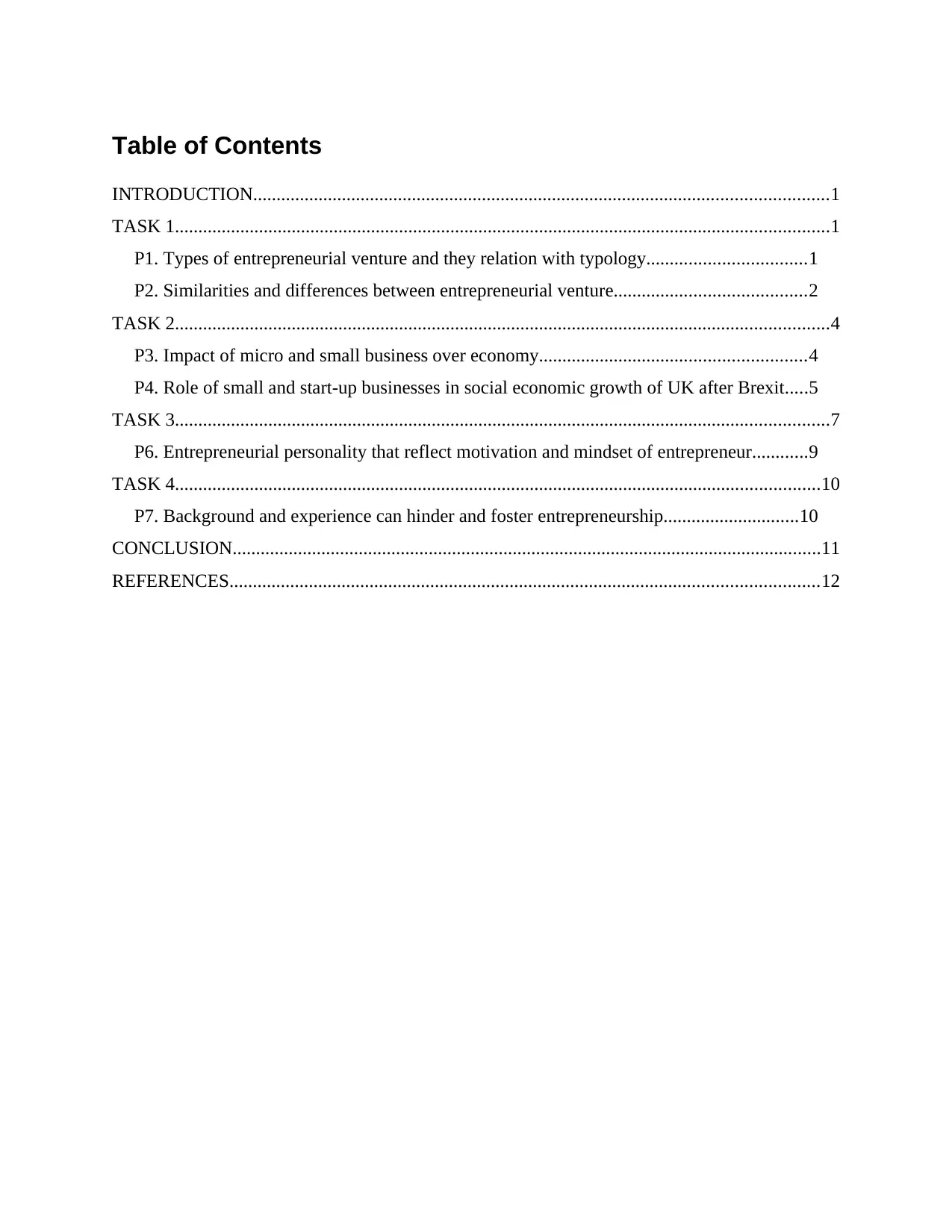
Table of Contents
INTRODUCTION...........................................................................................................................1
TASK 1............................................................................................................................................1
P1. Types of entrepreneurial venture and they relation with typology..................................1
P2. Similarities and differences between entrepreneurial venture.........................................2
TASK 2............................................................................................................................................4
P3. Impact of micro and small business over economy.........................................................4
P4. Role of small and start-up businesses in social economic growth of UK after Brexit.....5
TASK 3............................................................................................................................................7
P6. Entrepreneurial personality that reflect motivation and mindset of entrepreneur............9
TASK 4..........................................................................................................................................10
P7. Background and experience can hinder and foster entrepreneurship.............................10
CONCLUSION..............................................................................................................................11
REFERENCES..............................................................................................................................12
INTRODUCTION...........................................................................................................................1
TASK 1............................................................................................................................................1
P1. Types of entrepreneurial venture and they relation with typology..................................1
P2. Similarities and differences between entrepreneurial venture.........................................2
TASK 2............................................................................................................................................4
P3. Impact of micro and small business over economy.........................................................4
P4. Role of small and start-up businesses in social economic growth of UK after Brexit.....5
TASK 3............................................................................................................................................7
P6. Entrepreneurial personality that reflect motivation and mindset of entrepreneur............9
TASK 4..........................................................................................................................................10
P7. Background and experience can hinder and foster entrepreneurship.............................10
CONCLUSION..............................................................................................................................11
REFERENCES..............................................................................................................................12
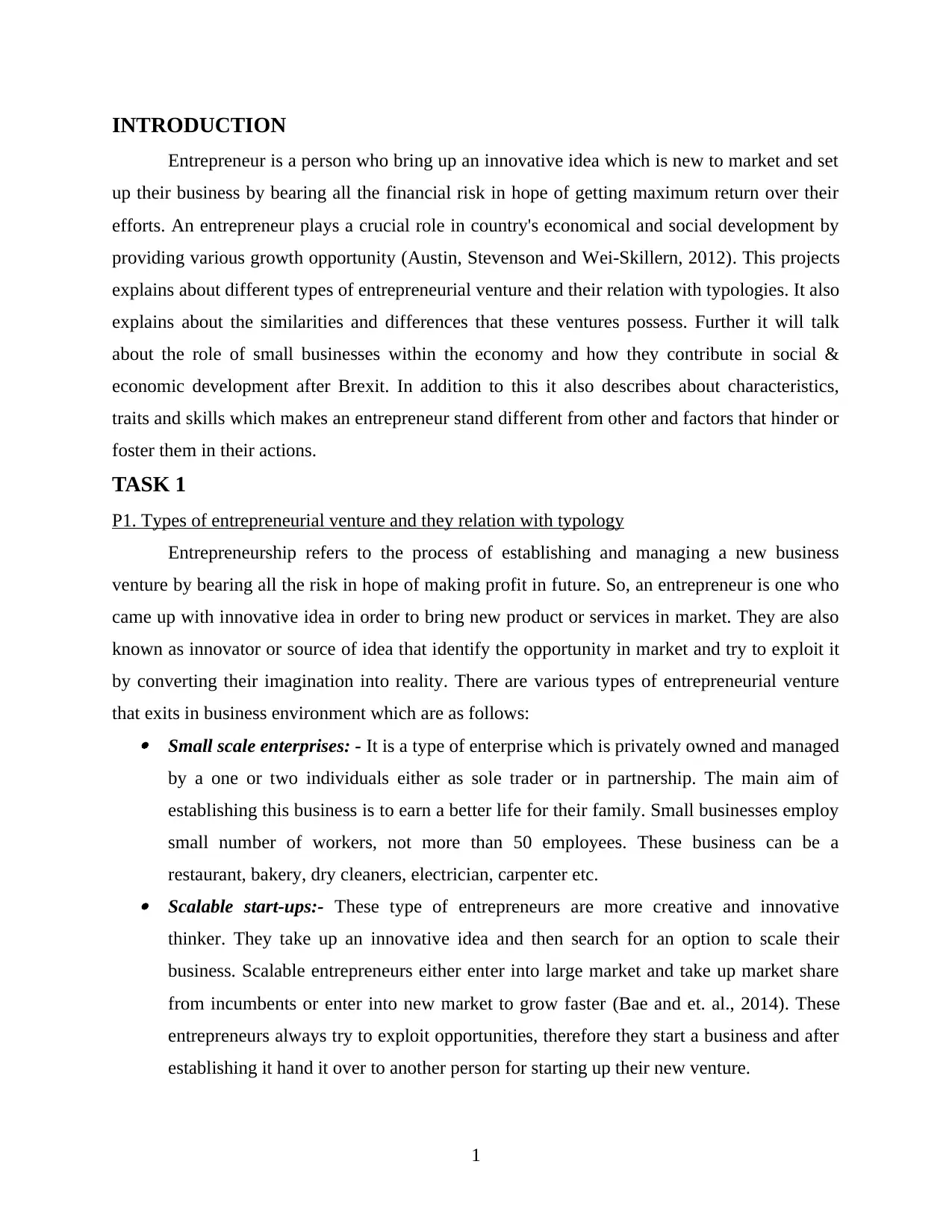
INTRODUCTION
Entrepreneur is a person who bring up an innovative idea which is new to market and set
up their business by bearing all the financial risk in hope of getting maximum return over their
efforts. An entrepreneur plays a crucial role in country's economical and social development by
providing various growth opportunity (Austin, Stevenson and Wei-Skillern, 2012). This projects
explains about different types of entrepreneurial venture and their relation with typologies. It also
explains about the similarities and differences that these ventures possess. Further it will talk
about the role of small businesses within the economy and how they contribute in social &
economic development after Brexit. In addition to this it also describes about characteristics,
traits and skills which makes an entrepreneur stand different from other and factors that hinder or
foster them in their actions.
TASK 1
P1. Types of entrepreneurial venture and they relation with typology
Entrepreneurship refers to the process of establishing and managing a new business
venture by bearing all the risk in hope of making profit in future. So, an entrepreneur is one who
came up with innovative idea in order to bring new product or services in market. They are also
known as innovator or source of idea that identify the opportunity in market and try to exploit it
by converting their imagination into reality. There are various types of entrepreneurial venture
that exits in business environment which are as follows: Small scale enterprises: - It is a type of enterprise which is privately owned and managed
by a one or two individuals either as sole trader or in partnership. The main aim of
establishing this business is to earn a better life for their family. Small businesses employ
small number of workers, not more than 50 employees. These business can be a
restaurant, bakery, dry cleaners, electrician, carpenter etc. Scalable start-ups:- These type of entrepreneurs are more creative and innovative
thinker. They take up an innovative idea and then search for an option to scale their
business. Scalable entrepreneurs either enter into large market and take up market share
from incumbents or enter into new market to grow faster (Bae and et. al., 2014). These
entrepreneurs always try to exploit opportunities, therefore they start a business and after
establishing it hand it over to another person for starting up their new venture.
1
Entrepreneur is a person who bring up an innovative idea which is new to market and set
up their business by bearing all the financial risk in hope of getting maximum return over their
efforts. An entrepreneur plays a crucial role in country's economical and social development by
providing various growth opportunity (Austin, Stevenson and Wei-Skillern, 2012). This projects
explains about different types of entrepreneurial venture and their relation with typologies. It also
explains about the similarities and differences that these ventures possess. Further it will talk
about the role of small businesses within the economy and how they contribute in social &
economic development after Brexit. In addition to this it also describes about characteristics,
traits and skills which makes an entrepreneur stand different from other and factors that hinder or
foster them in their actions.
TASK 1
P1. Types of entrepreneurial venture and they relation with typology
Entrepreneurship refers to the process of establishing and managing a new business
venture by bearing all the risk in hope of making profit in future. So, an entrepreneur is one who
came up with innovative idea in order to bring new product or services in market. They are also
known as innovator or source of idea that identify the opportunity in market and try to exploit it
by converting their imagination into reality. There are various types of entrepreneurial venture
that exits in business environment which are as follows: Small scale enterprises: - It is a type of enterprise which is privately owned and managed
by a one or two individuals either as sole trader or in partnership. The main aim of
establishing this business is to earn a better life for their family. Small businesses employ
small number of workers, not more than 50 employees. These business can be a
restaurant, bakery, dry cleaners, electrician, carpenter etc. Scalable start-ups:- These type of entrepreneurs are more creative and innovative
thinker. They take up an innovative idea and then search for an option to scale their
business. Scalable entrepreneurs either enter into large market and take up market share
from incumbents or enter into new market to grow faster (Bae and et. al., 2014). These
entrepreneurs always try to exploit opportunities, therefore they start a business and after
establishing it hand it over to another person for starting up their new venture.
1
⊘ This is a preview!⊘
Do you want full access?
Subscribe today to unlock all pages.

Trusted by 1+ million students worldwide
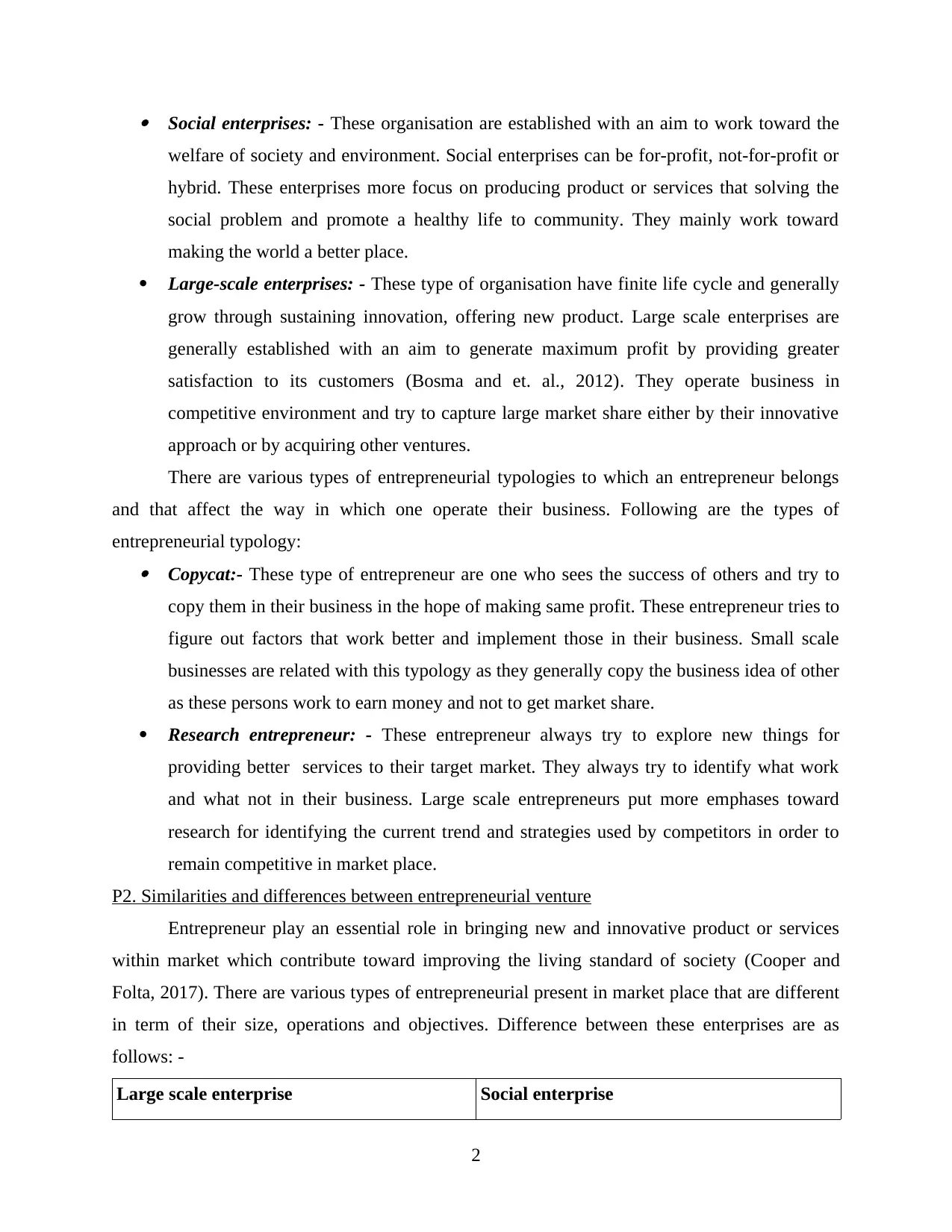
Social enterprises: - These organisation are established with an aim to work toward the
welfare of society and environment. Social enterprises can be for-profit, not-for-profit or
hybrid. These enterprises more focus on producing product or services that solving the
social problem and promote a healthy life to community. They mainly work toward
making the world a better place.
Large-scale enterprises: - These type of organisation have finite life cycle and generally
grow through sustaining innovation, offering new product. Large scale enterprises are
generally established with an aim to generate maximum profit by providing greater
satisfaction to its customers (Bosma and et. al., 2012). They operate business in
competitive environment and try to capture large market share either by their innovative
approach or by acquiring other ventures.
There are various types of entrepreneurial typologies to which an entrepreneur belongs
and that affect the way in which one operate their business. Following are the types of
entrepreneurial typology: Copycat:- These type of entrepreneur are one who sees the success of others and try to
copy them in their business in the hope of making same profit. These entrepreneur tries to
figure out factors that work better and implement those in their business. Small scale
businesses are related with this typology as they generally copy the business idea of other
as these persons work to earn money and not to get market share.
Research entrepreneur: - These entrepreneur always try to explore new things for
providing better services to their target market. They always try to identify what work
and what not in their business. Large scale entrepreneurs put more emphases toward
research for identifying the current trend and strategies used by competitors in order to
remain competitive in market place.
P2. Similarities and differences between entrepreneurial venture
Entrepreneur play an essential role in bringing new and innovative product or services
within market which contribute toward improving the living standard of society (Cooper and
Folta, 2017). There are various types of entrepreneurial present in market place that are different
in term of their size, operations and objectives. Difference between these enterprises are as
follows: -
Large scale enterprise Social enterprise
2
welfare of society and environment. Social enterprises can be for-profit, not-for-profit or
hybrid. These enterprises more focus on producing product or services that solving the
social problem and promote a healthy life to community. They mainly work toward
making the world a better place.
Large-scale enterprises: - These type of organisation have finite life cycle and generally
grow through sustaining innovation, offering new product. Large scale enterprises are
generally established with an aim to generate maximum profit by providing greater
satisfaction to its customers (Bosma and et. al., 2012). They operate business in
competitive environment and try to capture large market share either by their innovative
approach or by acquiring other ventures.
There are various types of entrepreneurial typologies to which an entrepreneur belongs
and that affect the way in which one operate their business. Following are the types of
entrepreneurial typology: Copycat:- These type of entrepreneur are one who sees the success of others and try to
copy them in their business in the hope of making same profit. These entrepreneur tries to
figure out factors that work better and implement those in their business. Small scale
businesses are related with this typology as they generally copy the business idea of other
as these persons work to earn money and not to get market share.
Research entrepreneur: - These entrepreneur always try to explore new things for
providing better services to their target market. They always try to identify what work
and what not in their business. Large scale entrepreneurs put more emphases toward
research for identifying the current trend and strategies used by competitors in order to
remain competitive in market place.
P2. Similarities and differences between entrepreneurial venture
Entrepreneur play an essential role in bringing new and innovative product or services
within market which contribute toward improving the living standard of society (Cooper and
Folta, 2017). There are various types of entrepreneurial present in market place that are different
in term of their size, operations and objectives. Difference between these enterprises are as
follows: -
Large scale enterprise Social enterprise
2
Paraphrase This Document
Need a fresh take? Get an instant paraphrase of this document with our AI Paraphraser
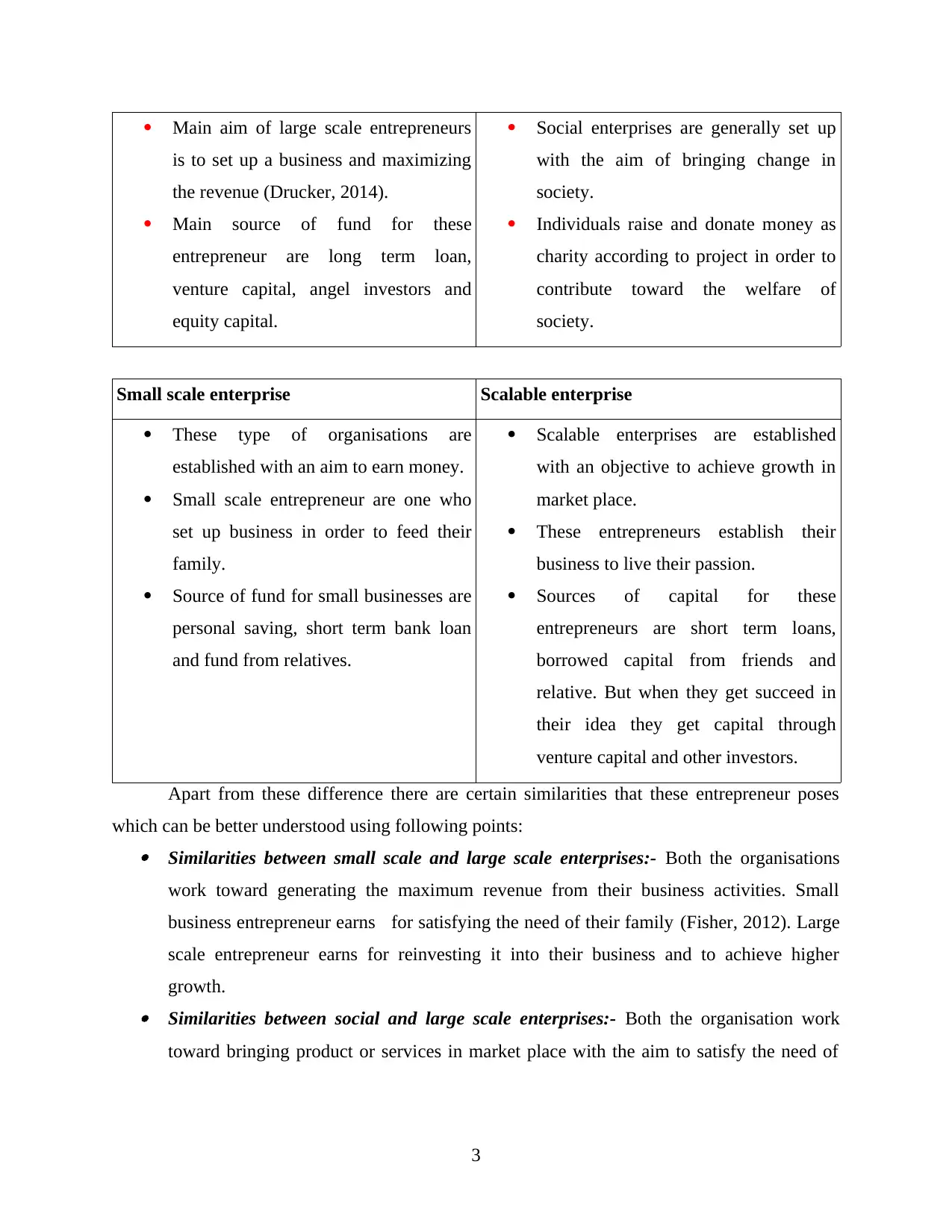
Main aim of large scale entrepreneurs
is to set up a business and maximizing
the revenue (Drucker, 2014).
Main source of fund for these
entrepreneur are long term loan,
venture capital, angel investors and
equity capital.
Social enterprises are generally set up
with the aim of bringing change in
society.
Individuals raise and donate money as
charity according to project in order to
contribute toward the welfare of
society.
Small scale enterprise Scalable enterprise
These type of organisations are
established with an aim to earn money.
Small scale entrepreneur are one who
set up business in order to feed their
family.
Source of fund for small businesses are
personal saving, short term bank loan
and fund from relatives.
Scalable enterprises are established
with an objective to achieve growth in
market place.
These entrepreneurs establish their
business to live their passion.
Sources of capital for these
entrepreneurs are short term loans,
borrowed capital from friends and
relative. But when they get succeed in
their idea they get capital through
venture capital and other investors.
Apart from these difference there are certain similarities that these entrepreneur poses
which can be better understood using following points: Similarities between small scale and large scale enterprises:- Both the organisations
work toward generating the maximum revenue from their business activities. Small
business entrepreneur earns for satisfying the need of their family (Fisher, 2012). Large
scale entrepreneur earns for reinvesting it into their business and to achieve higher
growth. Similarities between social and large scale enterprises:- Both the organisation work
toward bringing product or services in market place with the aim to satisfy the need of
3
is to set up a business and maximizing
the revenue (Drucker, 2014).
Main source of fund for these
entrepreneur are long term loan,
venture capital, angel investors and
equity capital.
Social enterprises are generally set up
with the aim of bringing change in
society.
Individuals raise and donate money as
charity according to project in order to
contribute toward the welfare of
society.
Small scale enterprise Scalable enterprise
These type of organisations are
established with an aim to earn money.
Small scale entrepreneur are one who
set up business in order to feed their
family.
Source of fund for small businesses are
personal saving, short term bank loan
and fund from relatives.
Scalable enterprises are established
with an objective to achieve growth in
market place.
These entrepreneurs establish their
business to live their passion.
Sources of capital for these
entrepreneurs are short term loans,
borrowed capital from friends and
relative. But when they get succeed in
their idea they get capital through
venture capital and other investors.
Apart from these difference there are certain similarities that these entrepreneur poses
which can be better understood using following points: Similarities between small scale and large scale enterprises:- Both the organisations
work toward generating the maximum revenue from their business activities. Small
business entrepreneur earns for satisfying the need of their family (Fisher, 2012). Large
scale entrepreneur earns for reinvesting it into their business and to achieve higher
growth. Similarities between social and large scale enterprises:- Both the organisation work
toward bringing product or services in market place with the aim to satisfy the need of
3
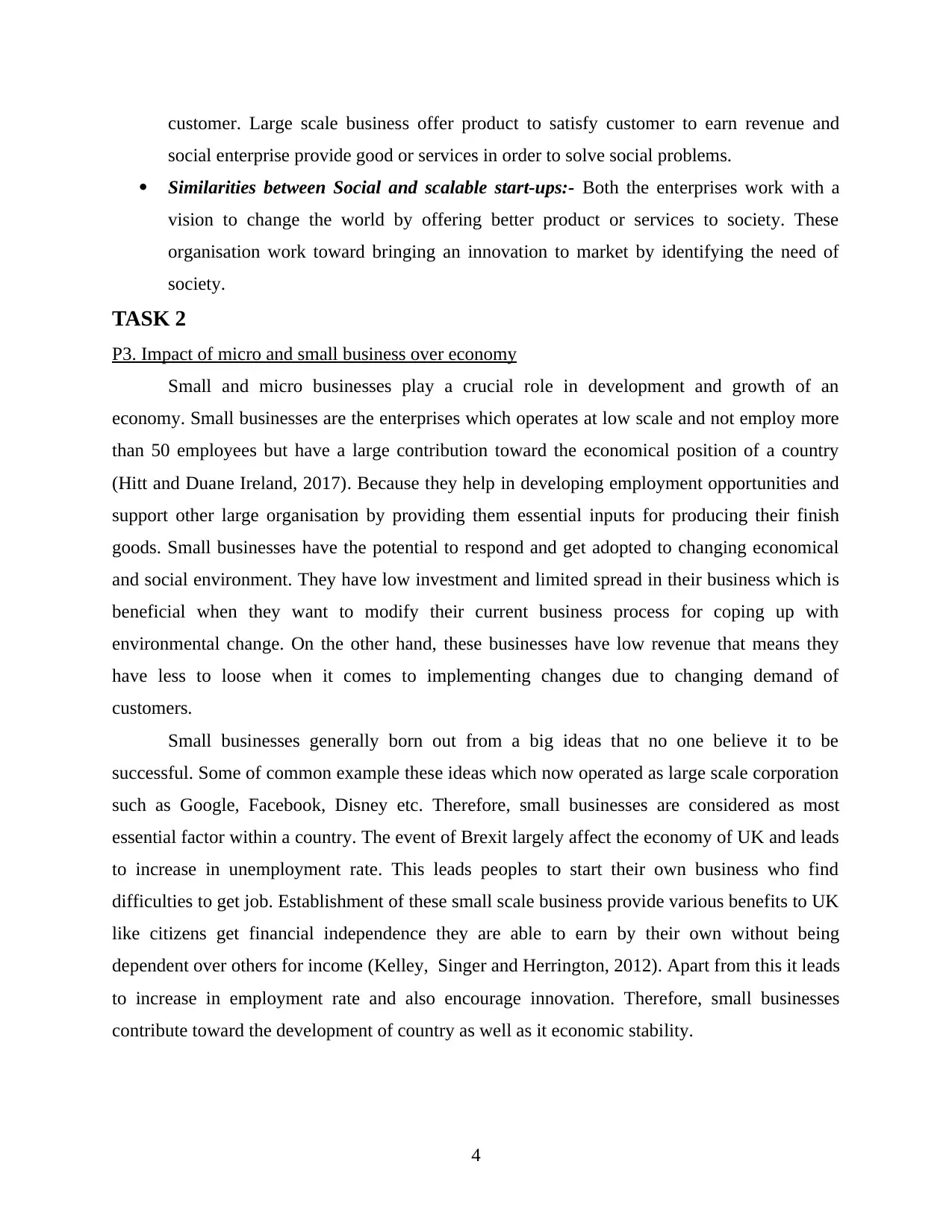
customer. Large scale business offer product to satisfy customer to earn revenue and
social enterprise provide good or services in order to solve social problems.
Similarities between Social and scalable start-ups:- Both the enterprises work with a
vision to change the world by offering better product or services to society. These
organisation work toward bringing an innovation to market by identifying the need of
society.
TASK 2
P3. Impact of micro and small business over economy
Small and micro businesses play a crucial role in development and growth of an
economy. Small businesses are the enterprises which operates at low scale and not employ more
than 50 employees but have a large contribution toward the economical position of a country
(Hitt and Duane Ireland, 2017). Because they help in developing employment opportunities and
support other large organisation by providing them essential inputs for producing their finish
goods. Small businesses have the potential to respond and get adopted to changing economical
and social environment. They have low investment and limited spread in their business which is
beneficial when they want to modify their current business process for coping up with
environmental change. On the other hand, these businesses have low revenue that means they
have less to loose when it comes to implementing changes due to changing demand of
customers.
Small businesses generally born out from a big ideas that no one believe it to be
successful. Some of common example these ideas which now operated as large scale corporation
such as Google, Facebook, Disney etc. Therefore, small businesses are considered as most
essential factor within a country. The event of Brexit largely affect the economy of UK and leads
to increase in unemployment rate. This leads peoples to start their own business who find
difficulties to get job. Establishment of these small scale business provide various benefits to UK
like citizens get financial independence they are able to earn by their own without being
dependent over others for income (Kelley, Singer and Herrington, 2012). Apart from this it leads
to increase in employment rate and also encourage innovation. Therefore, small businesses
contribute toward the development of country as well as it economic stability.
4
social enterprise provide good or services in order to solve social problems.
Similarities between Social and scalable start-ups:- Both the enterprises work with a
vision to change the world by offering better product or services to society. These
organisation work toward bringing an innovation to market by identifying the need of
society.
TASK 2
P3. Impact of micro and small business over economy
Small and micro businesses play a crucial role in development and growth of an
economy. Small businesses are the enterprises which operates at low scale and not employ more
than 50 employees but have a large contribution toward the economical position of a country
(Hitt and Duane Ireland, 2017). Because they help in developing employment opportunities and
support other large organisation by providing them essential inputs for producing their finish
goods. Small businesses have the potential to respond and get adopted to changing economical
and social environment. They have low investment and limited spread in their business which is
beneficial when they want to modify their current business process for coping up with
environmental change. On the other hand, these businesses have low revenue that means they
have less to loose when it comes to implementing changes due to changing demand of
customers.
Small businesses generally born out from a big ideas that no one believe it to be
successful. Some of common example these ideas which now operated as large scale corporation
such as Google, Facebook, Disney etc. Therefore, small businesses are considered as most
essential factor within a country. The event of Brexit largely affect the economy of UK and leads
to increase in unemployment rate. This leads peoples to start their own business who find
difficulties to get job. Establishment of these small scale business provide various benefits to UK
like citizens get financial independence they are able to earn by their own without being
dependent over others for income (Kelley, Singer and Herrington, 2012). Apart from this it leads
to increase in employment rate and also encourage innovation. Therefore, small businesses
contribute toward the development of country as well as it economic stability.
4
⊘ This is a preview!⊘
Do you want full access?
Subscribe today to unlock all pages.

Trusted by 1+ million students worldwide
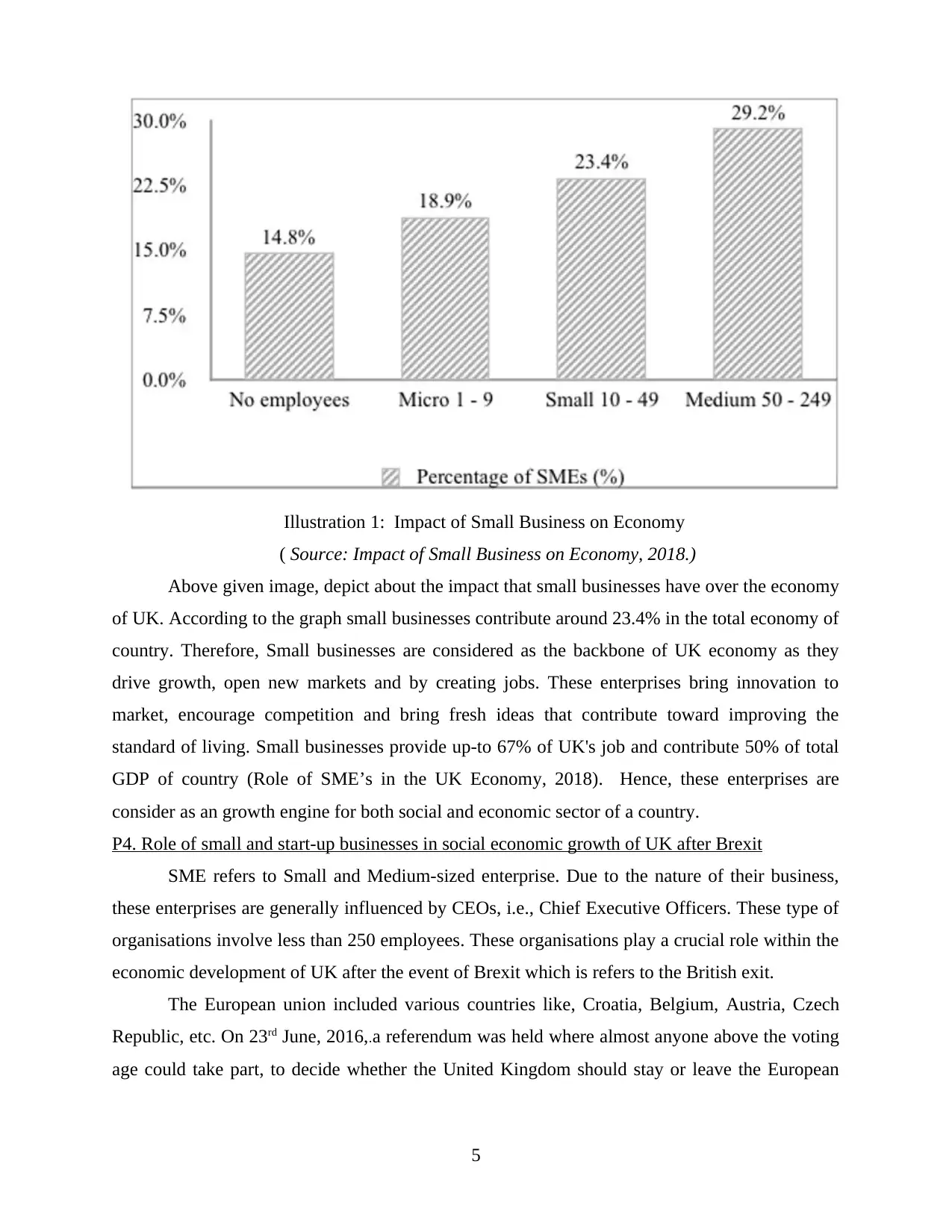
( Source: Impact of Small Business on Economy, 2018.)
Above given image, depict about the impact that small businesses have over the economy
of UK. According to the graph small businesses contribute around 23.4% in the total economy of
country. Therefore, Small businesses are considered as the backbone of UK economy as they
drive growth, open new markets and by creating jobs. These enterprises bring innovation to
market, encourage competition and bring fresh ideas that contribute toward improving the
standard of living. Small businesses provide up-to 67% of UK's job and contribute 50% of total
GDP of country (Role of SME’s in the UK Economy, 2018). Hence, these enterprises are
consider as an growth engine for both social and economic sector of a country.
P4. Role of small and start-up businesses in social economic growth of UK after Brexit
SME refers to Small and Medium-sized enterprise. Due to the nature of their business,
these enterprises are generally influenced by CEOs, i.e., Chief Executive Officers. These type of
organisations involve less than 250 employees. These organisations play a crucial role within the
economic development of UK after the event of Brexit which is refers to the British exit.
The European union included various countries like, Croatia, Belgium, Austria, Czech
Republic, etc. On 23rd June, 2016,.a referendum was held where almost anyone above the voting
age could take part, to decide whether the United Kingdom should stay or leave the European
5
Illustration 1: Impact of Small Business on Economy
Above given image, depict about the impact that small businesses have over the economy
of UK. According to the graph small businesses contribute around 23.4% in the total economy of
country. Therefore, Small businesses are considered as the backbone of UK economy as they
drive growth, open new markets and by creating jobs. These enterprises bring innovation to
market, encourage competition and bring fresh ideas that contribute toward improving the
standard of living. Small businesses provide up-to 67% of UK's job and contribute 50% of total
GDP of country (Role of SME’s in the UK Economy, 2018). Hence, these enterprises are
consider as an growth engine for both social and economic sector of a country.
P4. Role of small and start-up businesses in social economic growth of UK after Brexit
SME refers to Small and Medium-sized enterprise. Due to the nature of their business,
these enterprises are generally influenced by CEOs, i.e., Chief Executive Officers. These type of
organisations involve less than 250 employees. These organisations play a crucial role within the
economic development of UK after the event of Brexit which is refers to the British exit.
The European union included various countries like, Croatia, Belgium, Austria, Czech
Republic, etc. On 23rd June, 2016,.a referendum was held where almost anyone above the voting
age could take part, to decide whether the United Kingdom should stay or leave the European
5
Illustration 1: Impact of Small Business on Economy
Paraphrase This Document
Need a fresh take? Get an instant paraphrase of this document with our AI Paraphraser
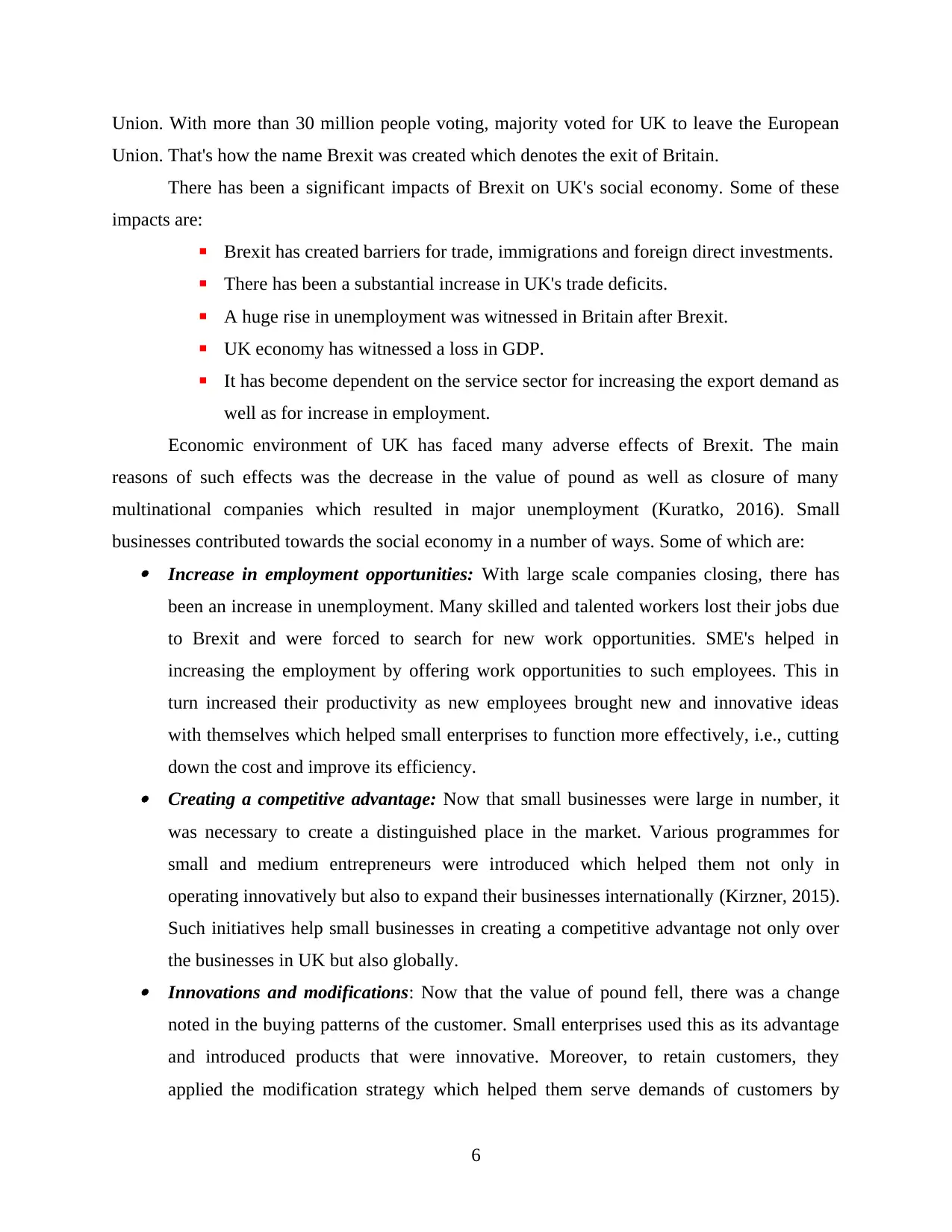
Union. With more than 30 million people voting, majority voted for UK to leave the European
Union. That's how the name Brexit was created which denotes the exit of Britain.
There has been a significant impacts of Brexit on UK's social economy. Some of these
impacts are:
▪ Brexit has created barriers for trade, immigrations and foreign direct investments.
▪ There has been a substantial increase in UK's trade deficits.
▪ A huge rise in unemployment was witnessed in Britain after Brexit.
▪ UK economy has witnessed a loss in GDP.
▪ It has become dependent on the service sector for increasing the export demand as
well as for increase in employment.
Economic environment of UK has faced many adverse effects of Brexit. The main
reasons of such effects was the decrease in the value of pound as well as closure of many
multinational companies which resulted in major unemployment (Kuratko, 2016). Small
businesses contributed towards the social economy in a number of ways. Some of which are: Increase in employment opportunities: With large scale companies closing, there has
been an increase in unemployment. Many skilled and talented workers lost their jobs due
to Brexit and were forced to search for new work opportunities. SME's helped in
increasing the employment by offering work opportunities to such employees. This in
turn increased their productivity as new employees brought new and innovative ideas
with themselves which helped small enterprises to function more effectively, i.e., cutting
down the cost and improve its efficiency. Creating a competitive advantage: Now that small businesses were large in number, it
was necessary to create a distinguished place in the market. Various programmes for
small and medium entrepreneurs were introduced which helped them not only in
operating innovatively but also to expand their businesses internationally (Kirzner, 2015).
Such initiatives help small businesses in creating a competitive advantage not only over
the businesses in UK but also globally. Innovations and modifications: Now that the value of pound fell, there was a change
noted in the buying patterns of the customer. Small enterprises used this as its advantage
and introduced products that were innovative. Moreover, to retain customers, they
applied the modification strategy which helped them serve demands of customers by
6
Union. That's how the name Brexit was created which denotes the exit of Britain.
There has been a significant impacts of Brexit on UK's social economy. Some of these
impacts are:
▪ Brexit has created barriers for trade, immigrations and foreign direct investments.
▪ There has been a substantial increase in UK's trade deficits.
▪ A huge rise in unemployment was witnessed in Britain after Brexit.
▪ UK economy has witnessed a loss in GDP.
▪ It has become dependent on the service sector for increasing the export demand as
well as for increase in employment.
Economic environment of UK has faced many adverse effects of Brexit. The main
reasons of such effects was the decrease in the value of pound as well as closure of many
multinational companies which resulted in major unemployment (Kuratko, 2016). Small
businesses contributed towards the social economy in a number of ways. Some of which are: Increase in employment opportunities: With large scale companies closing, there has
been an increase in unemployment. Many skilled and talented workers lost their jobs due
to Brexit and were forced to search for new work opportunities. SME's helped in
increasing the employment by offering work opportunities to such employees. This in
turn increased their productivity as new employees brought new and innovative ideas
with themselves which helped small enterprises to function more effectively, i.e., cutting
down the cost and improve its efficiency. Creating a competitive advantage: Now that small businesses were large in number, it
was necessary to create a distinguished place in the market. Various programmes for
small and medium entrepreneurs were introduced which helped them not only in
operating innovatively but also to expand their businesses internationally (Kirzner, 2015).
Such initiatives help small businesses in creating a competitive advantage not only over
the businesses in UK but also globally. Innovations and modifications: Now that the value of pound fell, there was a change
noted in the buying patterns of the customer. Small enterprises used this as its advantage
and introduced products that were innovative. Moreover, to retain customers, they
applied the modification strategy which helped them serve demands of customers by
6
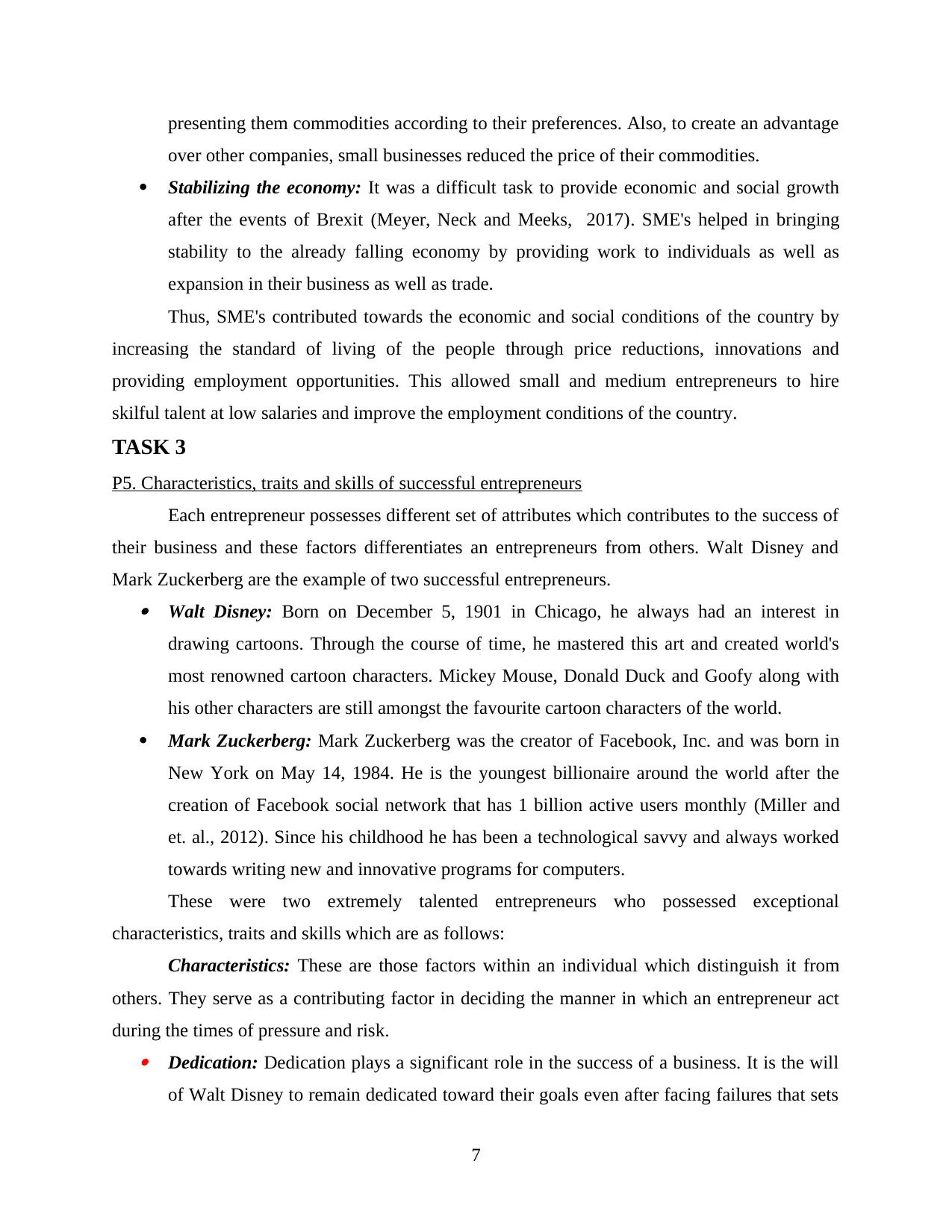
presenting them commodities according to their preferences. Also, to create an advantage
over other companies, small businesses reduced the price of their commodities.
Stabilizing the economy: It was a difficult task to provide economic and social growth
after the events of Brexit (Meyer, Neck and Meeks, 2017). SME's helped in bringing
stability to the already falling economy by providing work to individuals as well as
expansion in their business as well as trade.
Thus, SME's contributed towards the economic and social conditions of the country by
increasing the standard of living of the people through price reductions, innovations and
providing employment opportunities. This allowed small and medium entrepreneurs to hire
skilful talent at low salaries and improve the employment conditions of the country.
TASK 3
P5. Characteristics, traits and skills of successful entrepreneurs
Each entrepreneur possesses different set of attributes which contributes to the success of
their business and these factors differentiates an entrepreneurs from others. Walt Disney and
Mark Zuckerberg are the example of two successful entrepreneurs. Walt Disney: Born on December 5, 1901 in Chicago, he always had an interest in
drawing cartoons. Through the course of time, he mastered this art and created world's
most renowned cartoon characters. Mickey Mouse, Donald Duck and Goofy along with
his other characters are still amongst the favourite cartoon characters of the world.
Mark Zuckerberg: Mark Zuckerberg was the creator of Facebook, Inc. and was born in
New York on May 14, 1984. He is the youngest billionaire around the world after the
creation of Facebook social network that has 1 billion active users monthly (Miller and
et. al., 2012). Since his childhood he has been a technological savvy and always worked
towards writing new and innovative programs for computers.
These were two extremely talented entrepreneurs who possessed exceptional
characteristics, traits and skills which are as follows:
Characteristics: These are those factors within an individual which distinguish it from
others. They serve as a contributing factor in deciding the manner in which an entrepreneur act
during the times of pressure and risk. Dedication: Dedication plays a significant role in the success of a business. It is the will
of Walt Disney to remain dedicated toward their goals even after facing failures that sets
7
over other companies, small businesses reduced the price of their commodities.
Stabilizing the economy: It was a difficult task to provide economic and social growth
after the events of Brexit (Meyer, Neck and Meeks, 2017). SME's helped in bringing
stability to the already falling economy by providing work to individuals as well as
expansion in their business as well as trade.
Thus, SME's contributed towards the economic and social conditions of the country by
increasing the standard of living of the people through price reductions, innovations and
providing employment opportunities. This allowed small and medium entrepreneurs to hire
skilful talent at low salaries and improve the employment conditions of the country.
TASK 3
P5. Characteristics, traits and skills of successful entrepreneurs
Each entrepreneur possesses different set of attributes which contributes to the success of
their business and these factors differentiates an entrepreneurs from others. Walt Disney and
Mark Zuckerberg are the example of two successful entrepreneurs. Walt Disney: Born on December 5, 1901 in Chicago, he always had an interest in
drawing cartoons. Through the course of time, he mastered this art and created world's
most renowned cartoon characters. Mickey Mouse, Donald Duck and Goofy along with
his other characters are still amongst the favourite cartoon characters of the world.
Mark Zuckerberg: Mark Zuckerberg was the creator of Facebook, Inc. and was born in
New York on May 14, 1984. He is the youngest billionaire around the world after the
creation of Facebook social network that has 1 billion active users monthly (Miller and
et. al., 2012). Since his childhood he has been a technological savvy and always worked
towards writing new and innovative programs for computers.
These were two extremely talented entrepreneurs who possessed exceptional
characteristics, traits and skills which are as follows:
Characteristics: These are those factors within an individual which distinguish it from
others. They serve as a contributing factor in deciding the manner in which an entrepreneur act
during the times of pressure and risk. Dedication: Dedication plays a significant role in the success of a business. It is the will
of Walt Disney to remain dedicated toward their goals even after facing failures that sets
7
⊘ This is a preview!⊘
Do you want full access?
Subscribe today to unlock all pages.

Trusted by 1+ million students worldwide
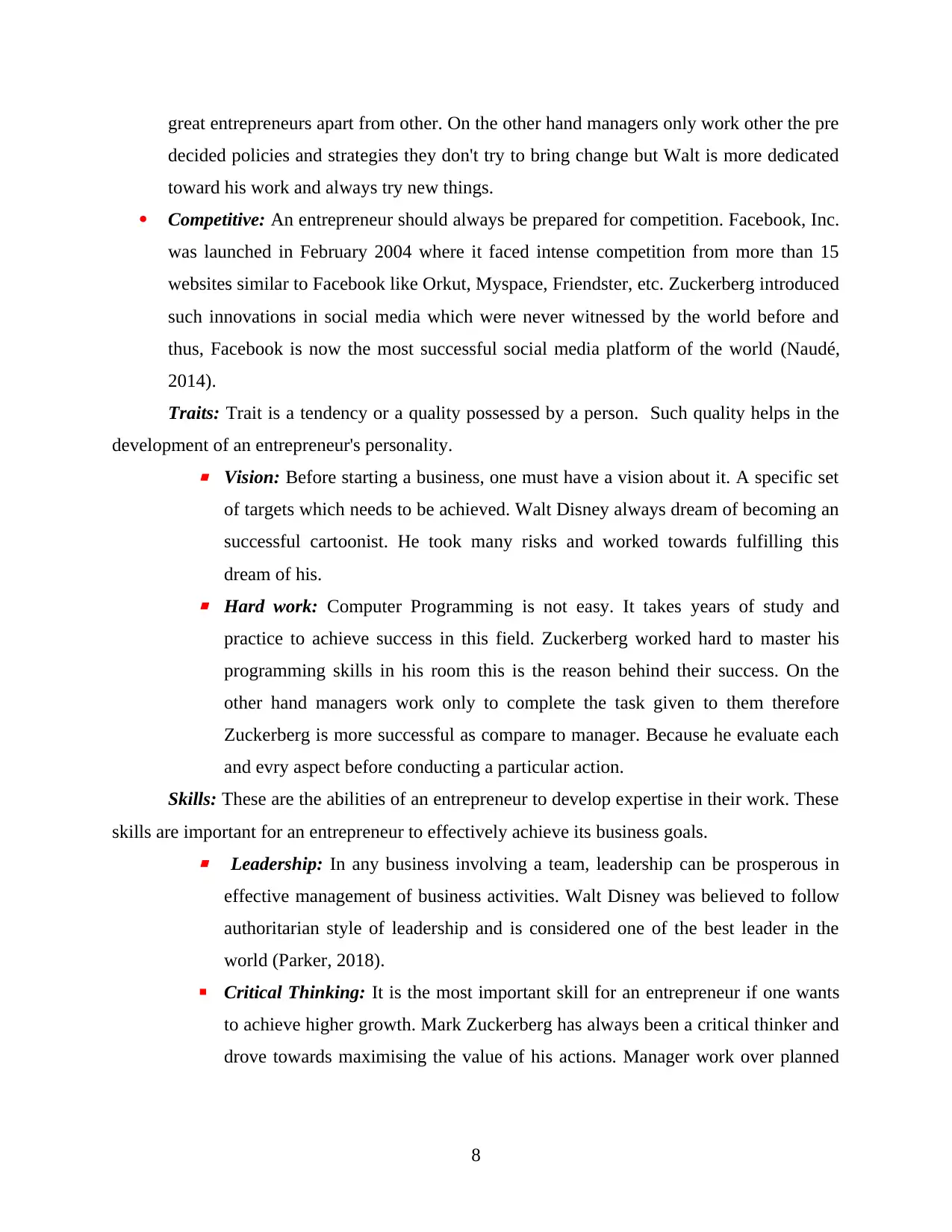
great entrepreneurs apart from other. On the other hand managers only work other the pre
decided policies and strategies they don't try to bring change but Walt is more dedicated
toward his work and always try new things.
Competitive: An entrepreneur should always be prepared for competition. Facebook, Inc.
was launched in February 2004 where it faced intense competition from more than 15
websites similar to Facebook like Orkut, Myspace, Friendster, etc. Zuckerberg introduced
such innovations in social media which were never witnessed by the world before and
thus, Facebook is now the most successful social media platform of the world (Naudé,
2014).
Traits: Trait is a tendency or a quality possessed by a person. Such quality helps in the
development of an entrepreneur's personality.
▪ Vision: Before starting a business, one must have a vision about it. A specific set
of targets which needs to be achieved. Walt Disney always dream of becoming an
successful cartoonist. He took many risks and worked towards fulfilling this
dream of his.
▪ Hard work: Computer Programming is not easy. It takes years of study and
practice to achieve success in this field. Zuckerberg worked hard to master his
programming skills in his room this is the reason behind their success. On the
other hand managers work only to complete the task given to them therefore
Zuckerberg is more successful as compare to manager. Because he evaluate each
and evry aspect before conducting a particular action.
Skills: These are the abilities of an entrepreneur to develop expertise in their work. These
skills are important for an entrepreneur to effectively achieve its business goals.
▪ Leadership: In any business involving a team, leadership can be prosperous in
effective management of business activities. Walt Disney was believed to follow
authoritarian style of leadership and is considered one of the best leader in the
world (Parker, 2018).
▪ Critical Thinking: It is the most important skill for an entrepreneur if one wants
to achieve higher growth. Mark Zuckerberg has always been a critical thinker and
drove towards maximising the value of his actions. Manager work over planned
8
decided policies and strategies they don't try to bring change but Walt is more dedicated
toward his work and always try new things.
Competitive: An entrepreneur should always be prepared for competition. Facebook, Inc.
was launched in February 2004 where it faced intense competition from more than 15
websites similar to Facebook like Orkut, Myspace, Friendster, etc. Zuckerberg introduced
such innovations in social media which were never witnessed by the world before and
thus, Facebook is now the most successful social media platform of the world (Naudé,
2014).
Traits: Trait is a tendency or a quality possessed by a person. Such quality helps in the
development of an entrepreneur's personality.
▪ Vision: Before starting a business, one must have a vision about it. A specific set
of targets which needs to be achieved. Walt Disney always dream of becoming an
successful cartoonist. He took many risks and worked towards fulfilling this
dream of his.
▪ Hard work: Computer Programming is not easy. It takes years of study and
practice to achieve success in this field. Zuckerberg worked hard to master his
programming skills in his room this is the reason behind their success. On the
other hand managers work only to complete the task given to them therefore
Zuckerberg is more successful as compare to manager. Because he evaluate each
and evry aspect before conducting a particular action.
Skills: These are the abilities of an entrepreneur to develop expertise in their work. These
skills are important for an entrepreneur to effectively achieve its business goals.
▪ Leadership: In any business involving a team, leadership can be prosperous in
effective management of business activities. Walt Disney was believed to follow
authoritarian style of leadership and is considered one of the best leader in the
world (Parker, 2018).
▪ Critical Thinking: It is the most important skill for an entrepreneur if one wants
to achieve higher growth. Mark Zuckerberg has always been a critical thinker and
drove towards maximising the value of his actions. Manager work over planned
8
Paraphrase This Document
Need a fresh take? Get an instant paraphrase of this document with our AI Paraphraser
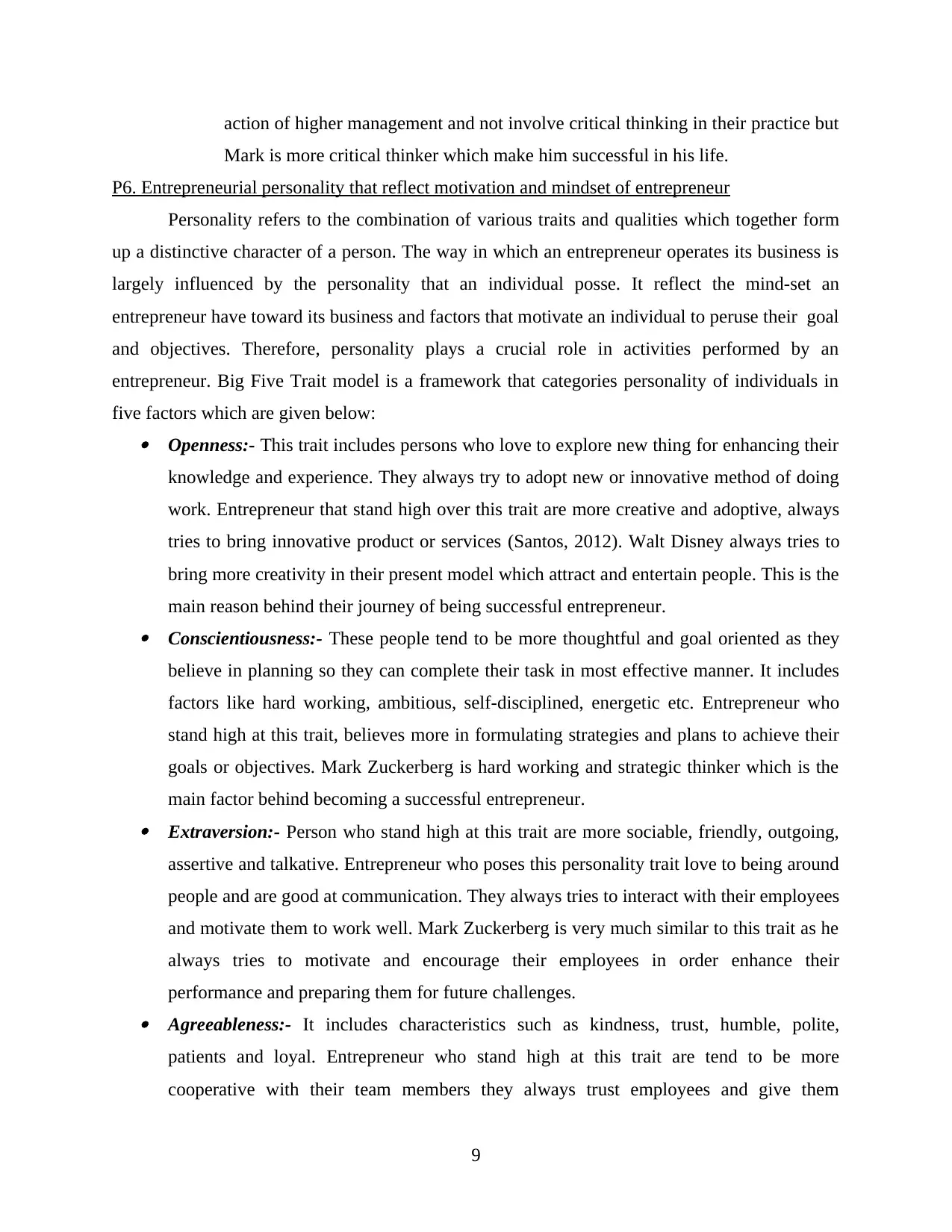
action of higher management and not involve critical thinking in their practice but
Mark is more critical thinker which make him successful in his life.
P6. Entrepreneurial personality that reflect motivation and mindset of entrepreneur
Personality refers to the combination of various traits and qualities which together form
up a distinctive character of a person. The way in which an entrepreneur operates its business is
largely influenced by the personality that an individual posse. It reflect the mind-set an
entrepreneur have toward its business and factors that motivate an individual to peruse their goal
and objectives. Therefore, personality plays a crucial role in activities performed by an
entrepreneur. Big Five Trait model is a framework that categories personality of individuals in
five factors which are given below: Openness:- This trait includes persons who love to explore new thing for enhancing their
knowledge and experience. They always try to adopt new or innovative method of doing
work. Entrepreneur that stand high over this trait are more creative and adoptive, always
tries to bring innovative product or services (Santos, 2012). Walt Disney always tries to
bring more creativity in their present model which attract and entertain people. This is the
main reason behind their journey of being successful entrepreneur. Conscientiousness:- These people tend to be more thoughtful and goal oriented as they
believe in planning so they can complete their task in most effective manner. It includes
factors like hard working, ambitious, self-disciplined, energetic etc. Entrepreneur who
stand high at this trait, believes more in formulating strategies and plans to achieve their
goals or objectives. Mark Zuckerberg is hard working and strategic thinker which is the
main factor behind becoming a successful entrepreneur. Extraversion:- Person who stand high at this trait are more sociable, friendly, outgoing,
assertive and talkative. Entrepreneur who poses this personality trait love to being around
people and are good at communication. They always tries to interact with their employees
and motivate them to work well. Mark Zuckerberg is very much similar to this trait as he
always tries to motivate and encourage their employees in order enhance their
performance and preparing them for future challenges. Agreeableness:- It includes characteristics such as kindness, trust, humble, polite,
patients and loyal. Entrepreneur who stand high at this trait are tend to be more
cooperative with their team members they always trust employees and give them
9
Mark is more critical thinker which make him successful in his life.
P6. Entrepreneurial personality that reflect motivation and mindset of entrepreneur
Personality refers to the combination of various traits and qualities which together form
up a distinctive character of a person. The way in which an entrepreneur operates its business is
largely influenced by the personality that an individual posse. It reflect the mind-set an
entrepreneur have toward its business and factors that motivate an individual to peruse their goal
and objectives. Therefore, personality plays a crucial role in activities performed by an
entrepreneur. Big Five Trait model is a framework that categories personality of individuals in
five factors which are given below: Openness:- This trait includes persons who love to explore new thing for enhancing their
knowledge and experience. They always try to adopt new or innovative method of doing
work. Entrepreneur that stand high over this trait are more creative and adoptive, always
tries to bring innovative product or services (Santos, 2012). Walt Disney always tries to
bring more creativity in their present model which attract and entertain people. This is the
main reason behind their journey of being successful entrepreneur. Conscientiousness:- These people tend to be more thoughtful and goal oriented as they
believe in planning so they can complete their task in most effective manner. It includes
factors like hard working, ambitious, self-disciplined, energetic etc. Entrepreneur who
stand high at this trait, believes more in formulating strategies and plans to achieve their
goals or objectives. Mark Zuckerberg is hard working and strategic thinker which is the
main factor behind becoming a successful entrepreneur. Extraversion:- Person who stand high at this trait are more sociable, friendly, outgoing,
assertive and talkative. Entrepreneur who poses this personality trait love to being around
people and are good at communication. They always tries to interact with their employees
and motivate them to work well. Mark Zuckerberg is very much similar to this trait as he
always tries to motivate and encourage their employees in order enhance their
performance and preparing them for future challenges. Agreeableness:- It includes characteristics such as kindness, trust, humble, polite,
patients and loyal. Entrepreneur who stand high at this trait are tend to be more
cooperative with their team members they always trust employees and give them
9
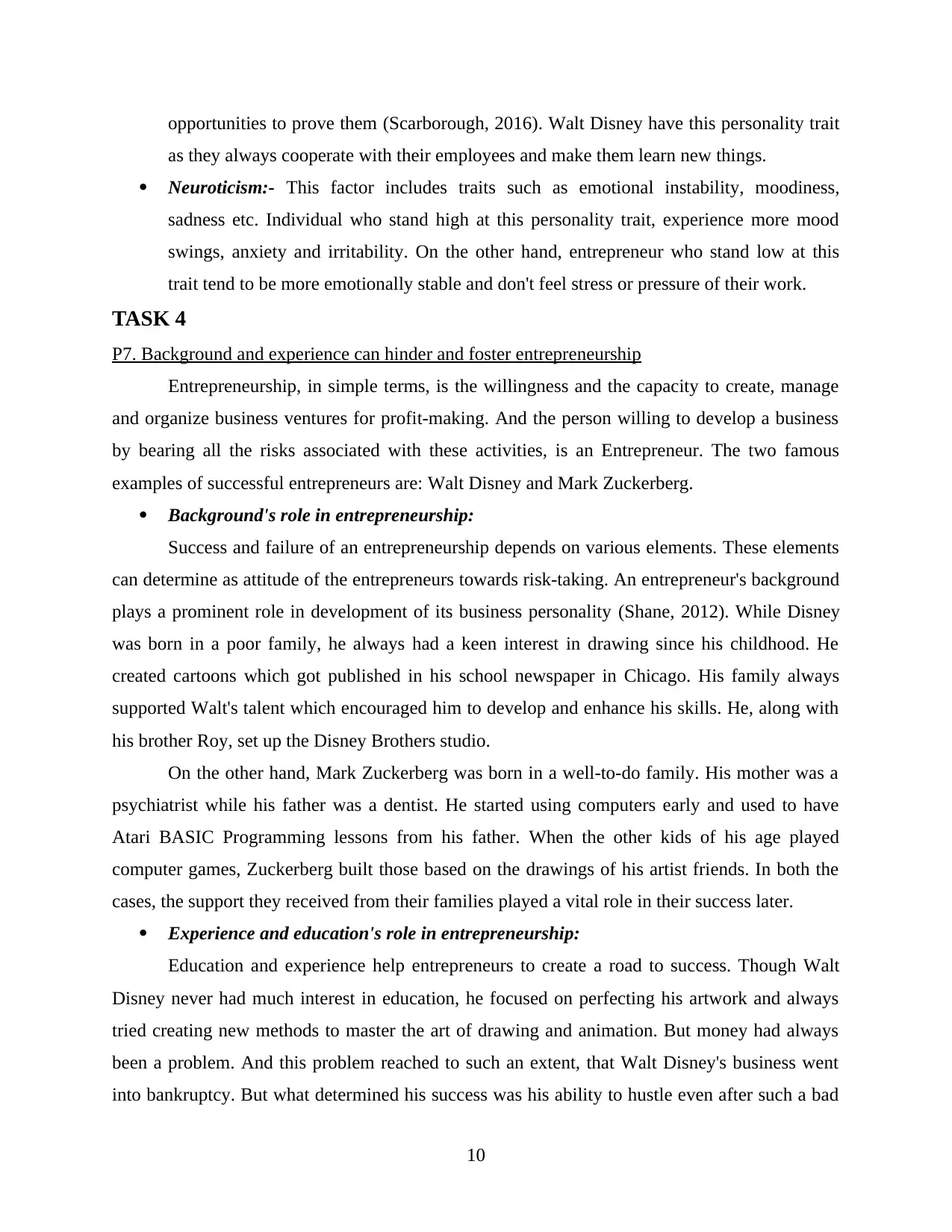
opportunities to prove them (Scarborough, 2016). Walt Disney have this personality trait
as they always cooperate with their employees and make them learn new things.
Neuroticism:- This factor includes traits such as emotional instability, moodiness,
sadness etc. Individual who stand high at this personality trait, experience more mood
swings, anxiety and irritability. On the other hand, entrepreneur who stand low at this
trait tend to be more emotionally stable and don't feel stress or pressure of their work.
TASK 4
P7. Background and experience can hinder and foster entrepreneurship
Entrepreneurship, in simple terms, is the willingness and the capacity to create, manage
and organize business ventures for profit-making. And the person willing to develop a business
by bearing all the risks associated with these activities, is an Entrepreneur. The two famous
examples of successful entrepreneurs are: Walt Disney and Mark Zuckerberg.
Background's role in entrepreneurship:
Success and failure of an entrepreneurship depends on various elements. These elements
can determine as attitude of the entrepreneurs towards risk-taking. An entrepreneur's background
plays a prominent role in development of its business personality (Shane, 2012). While Disney
was born in a poor family, he always had a keen interest in drawing since his childhood. He
created cartoons which got published in his school newspaper in Chicago. His family always
supported Walt's talent which encouraged him to develop and enhance his skills. He, along with
his brother Roy, set up the Disney Brothers studio.
On the other hand, Mark Zuckerberg was born in a well-to-do family. His mother was a
psychiatrist while his father was a dentist. He started using computers early and used to have
Atari BASIC Programming lessons from his father. When the other kids of his age played
computer games, Zuckerberg built those based on the drawings of his artist friends. In both the
cases, the support they received from their families played a vital role in their success later.
Experience and education's role in entrepreneurship:
Education and experience help entrepreneurs to create a road to success. Though Walt
Disney never had much interest in education, he focused on perfecting his artwork and always
tried creating new methods to master the art of drawing and animation. But money had always
been a problem. And this problem reached to such an extent, that Walt Disney's business went
into bankruptcy. But what determined his success was his ability to hustle even after such a bad
10
as they always cooperate with their employees and make them learn new things.
Neuroticism:- This factor includes traits such as emotional instability, moodiness,
sadness etc. Individual who stand high at this personality trait, experience more mood
swings, anxiety and irritability. On the other hand, entrepreneur who stand low at this
trait tend to be more emotionally stable and don't feel stress or pressure of their work.
TASK 4
P7. Background and experience can hinder and foster entrepreneurship
Entrepreneurship, in simple terms, is the willingness and the capacity to create, manage
and organize business ventures for profit-making. And the person willing to develop a business
by bearing all the risks associated with these activities, is an Entrepreneur. The two famous
examples of successful entrepreneurs are: Walt Disney and Mark Zuckerberg.
Background's role in entrepreneurship:
Success and failure of an entrepreneurship depends on various elements. These elements
can determine as attitude of the entrepreneurs towards risk-taking. An entrepreneur's background
plays a prominent role in development of its business personality (Shane, 2012). While Disney
was born in a poor family, he always had a keen interest in drawing since his childhood. He
created cartoons which got published in his school newspaper in Chicago. His family always
supported Walt's talent which encouraged him to develop and enhance his skills. He, along with
his brother Roy, set up the Disney Brothers studio.
On the other hand, Mark Zuckerberg was born in a well-to-do family. His mother was a
psychiatrist while his father was a dentist. He started using computers early and used to have
Atari BASIC Programming lessons from his father. When the other kids of his age played
computer games, Zuckerberg built those based on the drawings of his artist friends. In both the
cases, the support they received from their families played a vital role in their success later.
Experience and education's role in entrepreneurship:
Education and experience help entrepreneurs to create a road to success. Though Walt
Disney never had much interest in education, he focused on perfecting his artwork and always
tried creating new methods to master the art of drawing and animation. But money had always
been a problem. And this problem reached to such an extent, that Walt Disney's business went
into bankruptcy. But what determined his success was his ability to hustle even after such a bad
10
⊘ This is a preview!⊘
Do you want full access?
Subscribe today to unlock all pages.

Trusted by 1+ million students worldwide
1 out of 14
Related Documents
Your All-in-One AI-Powered Toolkit for Academic Success.
+13062052269
info@desklib.com
Available 24*7 on WhatsApp / Email
![[object Object]](/_next/static/media/star-bottom.7253800d.svg)
Unlock your academic potential
Copyright © 2020–2026 A2Z Services. All Rights Reserved. Developed and managed by ZUCOL.




